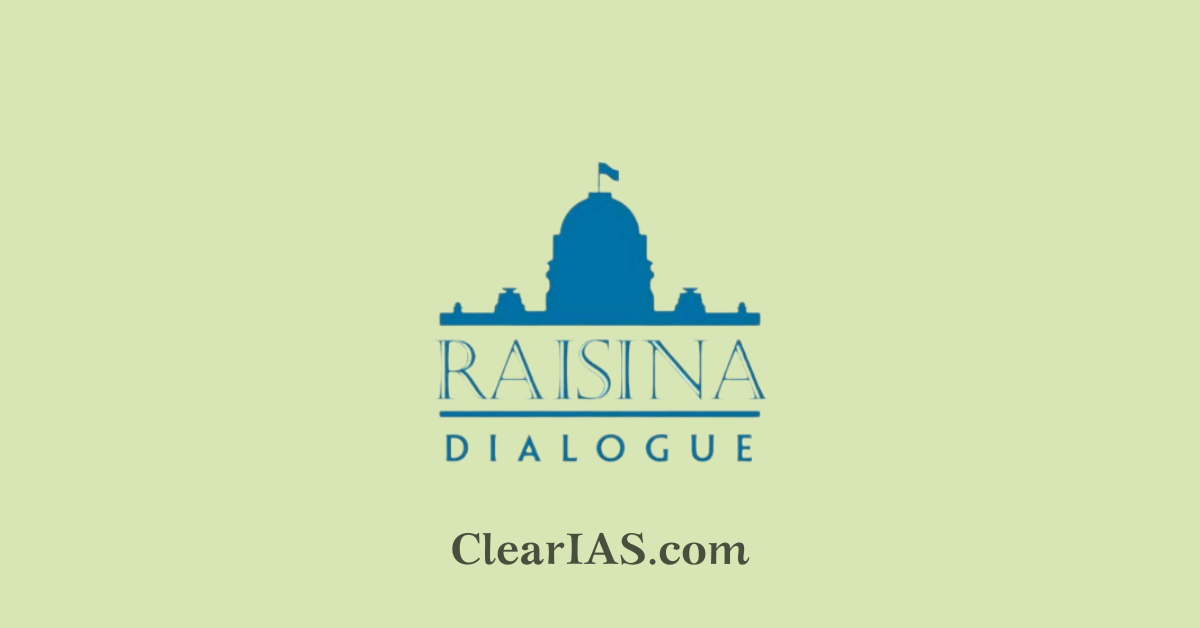
The Raisina Dialogue 2023 was recently inaugurated. It is India’s premier conference on geopolitics and geoeconomics committed to addressing the most challenging issues facing the global community. Read here to know more about the significance of the conference.
The Raisina Dialogue is India’s premier conference on geopolitics and geoeconomics committed to addressing the most challenging issues facing the global community.
Every year, leaders in politics, business, media, and civil society converge in New Delhi to discuss the state of the world and explore opportunities for cooperation on a wide range of contemporary matters.
The Dialogue is structured as a multi-stakeholder, cross-sectoral discussion, involving heads of state, cabinet ministers, and local government officials, who are joined by thought leaders from the private sector, media, and academia.
Raisina Dialogue 2023
The Raisina dialogue was incepted in 2016 and has since then emerged as a major platform for geopolitics and geo-economics.
The name “Raisina Dialogue” comes from Raisina Hill, an elevation in New Delhi, the seat of the Government of India, as well as the Presidential Palace of India, Rashtrapati Bhavan.
The conference is hosted by the Observer Research Foundation in partnership with the Ministry of External Affairs, Government of India.
- This effort is supported by a number of institutions, organizations, and individuals, who are committed to the mission of the conference.
2023 marks the 8th edition of this flagship conference of India. This year’s conference is significant in the backdrop of India’s G20 Presidency.
The theme for 2023 is: “Provocation, Uncertainty, Turbulence: Lighthouse in The Tempest?”
Raisina dialogue 2023 pillars
Note: Subscribe to the ClearIAS YouTube Channel to learn more.
- Neo insurgence: geographies, domains, ambitions
- Amoral mosaic: contest, cooperate, or cancel
- Chaotic codes: sovereignty, security, society
- Pernicious passports: climate, commons, citizens
- Grey Rhinos: democracies, dependencies, and debt traps
Neo insurgence: geographies, domains, ambitions
- Today’s geopolitical reality is the resurrection of old rivalries with a new cast of actors.
- Contemporary empire-building is being fuelled by worsening uncertainty across global economic and political domains.
- Populism is being weaponized and new spheres of influence are being carved out by the aggressively ambitious.
This pillar focuses on how trans-border strife and political upheavals be dealt with as a global community.
Read here: Kuril Islands dispute; India-China border disputes; Kyrgystan-Tajikistan conflict; Ukraine conflict.
Amoral mosaic: contest, cooperate, or cancel
- Limited-purpose partnerships and coalitions of convenience define alliance building today. Inter- and intra- regional groupings like the G20, SCO, Quad, I2U2, and AIIB, IPEF are replacing post-Cold War institutions.
- The underperformance of UN-backed institutions like WTO, World Bank, and IMF is being questioned by the global communities amid numerous crises.
The possibility of regional platforms being more tactical as alternative governance architecture to manage the 21st century is the focal point here.
Chaotic codes: sovereignty, security, society
- Technology has assumed a transnational character, disregarding national boundaries and private property, without the care and responsibility that governments and nations must have in their administration.
- Technology believes that its shareholders are the only people it must answer to while using its scary power.
- In contrast to its early promise of democratizing public discourse, new media is quickly becoming an unseen filter driven by ideology while old media rapidly decays.
The ways to navigate the digital sphere to minimize digital harms and catalyze benefits will the focus here.
Pernicious passports: climate, commons, citizens
- In its current form, globalization has done irreversible damage to the global commons. The impact of the climate crisis is pervasive, creating a vicious circle of poverty, exploitation, and inequality.
Questions like, how do we ensure resources are not concentrated in a few countries to the detriment of the many? Can the world invest in the adaptation and resilience of fragile ecosystems and small states? Do we need a new approach that allows for an equitable spread of risks across borders? Will be addressed here.
Grey Rhinos: democracies, dependencies, and debt traps
- A challenge to democratic institutions has emerged from fake dependence and disputes.
- Traditional disputes over land, water, and energy have crossed the digital divide. Information has been weaponized by both state and non-state entities.
- Debt traps have been created by vanity mandates and white elephant projects, endangering local communities as well as national politics.
Burning concepts of ‘good democracy’ and ‘bad democracy’, ethics of liberal democracy, etc will be debated upon here.
Observer Research Foundation (ORF)
ORF was established in 1990 as a neutral firm to critically assess the issues the nation was confronting and assist in formulating cogent policy solutions while India transitioned to a new engagement with the international economic system.
- From primarily looking inward and engaging with domestic reforms, to gradually forging global partnerships, ORF today plays a seminal role in building political and policy consensus that enables India to interact with the world.
- As India begins to play a larger role in the 21st century, ORF continues to push normative boundaries, bring new ideas into the policy discourse, and provide a platform for a new generation of thinkers.
- It is supported in its mission by leading intellectuals, academicians, policymakers, business leaders, institutions and civil society actors.
Conclusion
The Raisina dialogue aids in identifying strategies for advancing an inclusive, rule-based international order. It offers a chance to talk about the key concepts underlying the new global reality.
The conference serves as a forum for friends and allies of India who are looking for common ground.
The Raisina Dialogue has grown to become a preeminent international affairs conference since its founding in 2016, attracting heads of state, ministers, journalists, professors, and researchers.
-Article Written by Swathi Satish






Leave a Reply